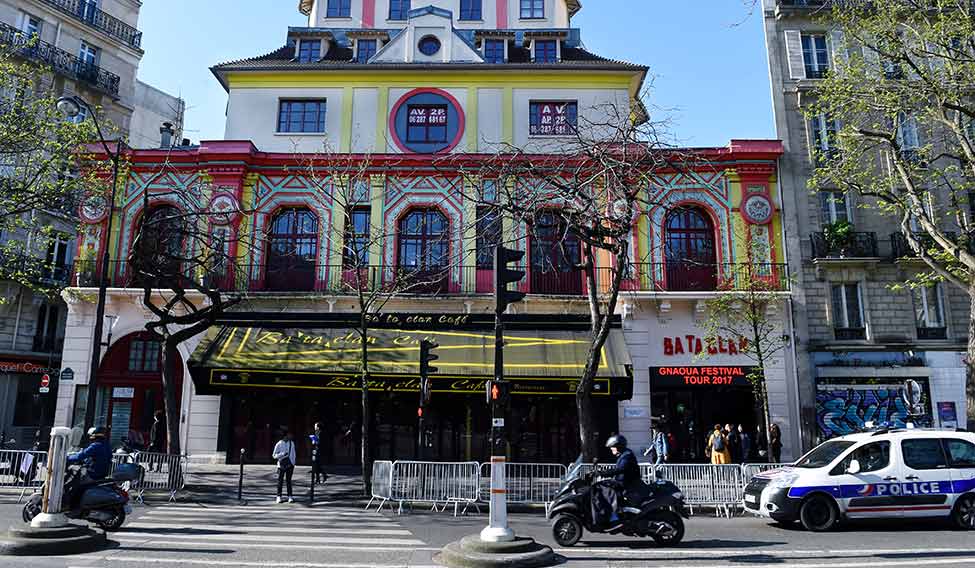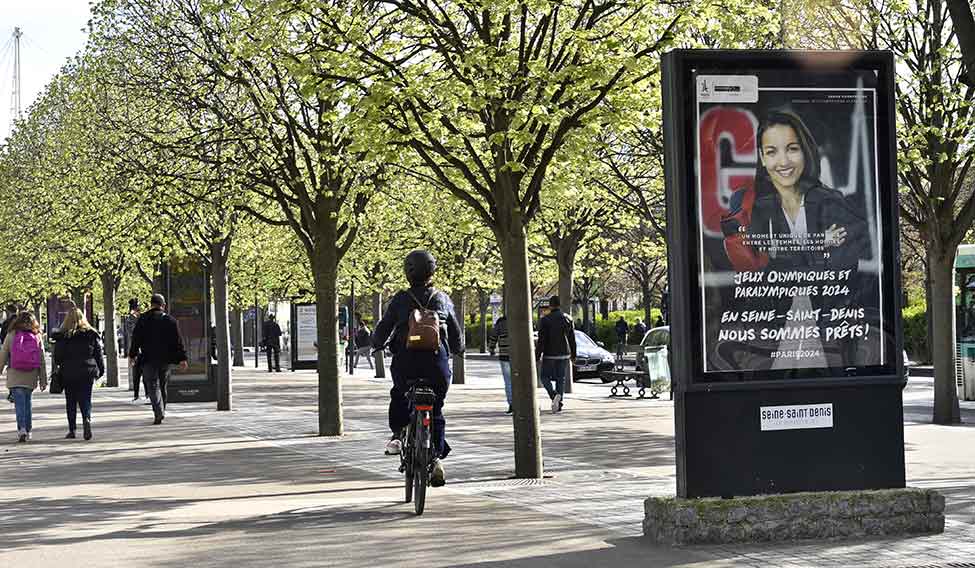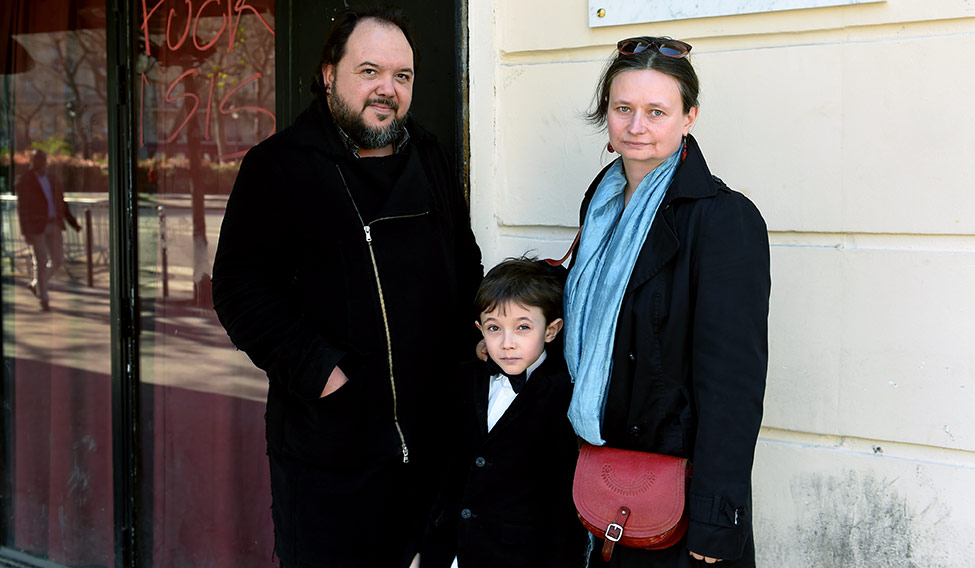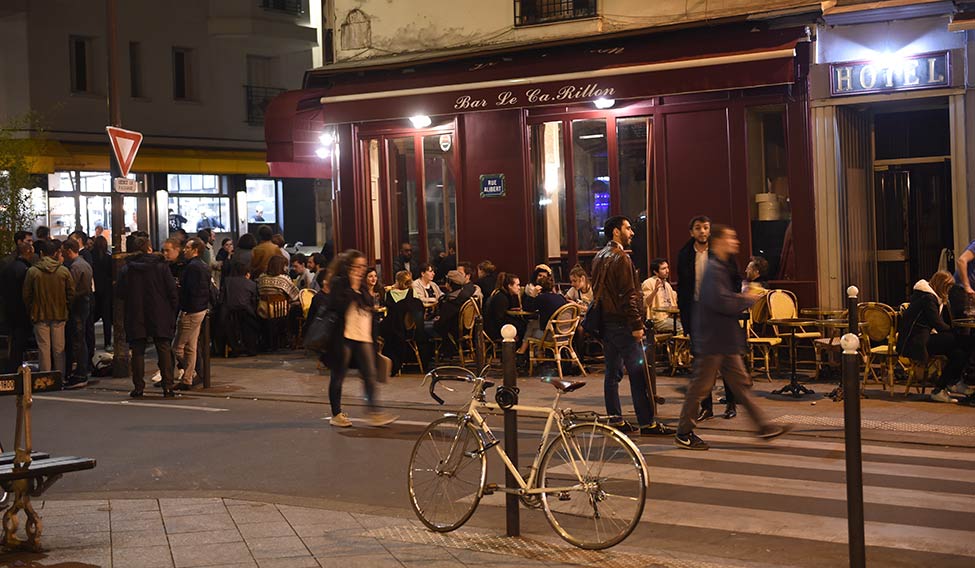The day we visited the Bataclan theatre, it was hosting the Gnaoua Festival Tour 2017, featuring a compilation of Moroccan spiritual songs and tunes. It seemed entirely appropriate as Gnaoua is known for its healing notes, and the iconic Paris theatre is recovering from a terrorist attack. Bataclan, which remained closed after the attacks on November 13, 2015, was reopened a year later, with a show dedicated to the memory of the 90 people who lost their lives in the attack.
Eighteen months have passed after that horrendous night. Yet, Paris and Bataclan are still weary. The joie de vivre so typical of the city is missing. As we stood watching the preparations for the evening show, one of the organisers asked us, rather rudely, to leave. “You cannot stand here. Step outside,” he said. “If you have a ticket for the event, come back in the evening.” We told him that we were journalists from India and asked him about the terrorist attack. “I have nothing to say to you,” was the response.
 Down, not out: The Bataclan theatre where 90 people lost their lives in a terrorist attack.
Down, not out: The Bataclan theatre where 90 people lost their lives in a terrorist attack.
Walking out disappointed, we met Laurent Langlois, a schoolteacher from Neuilly-sur-Seine, a Paris suburb. When we told him that we were unceremoniously thrown out, he said the relentless attacks were reshaping French attitudes and etiquettes. “We were not like this. It is not the French way to be rude to visitors. But you must understand that the unending wave of terrorist attacks, especially the November 13 attacks, are changing our society. We no longer feel safe,” he said. On the night of November 13, 2015, Islamic State terrorists unleashed a series of coordinated attacks at a number of locations in Paris, including Bataclan, Stade de France and iconic cafes like Le Carillon and Le Petit Cambodge, among other places. In the deadliest attacks on French soil since World War II, 130 people were killed. Eight months later came the truck attack in Nice, which resulted in 86 casualties. Since then, France has witnessed thirteen terrorist attacks although none with major casualties. The latest attack took place on April 20 in Paris, just two days before the first round of the presidential elections.
 Right move: An advertisement outside the Stade de France in support of the French bid for the 2024 Olympics.
Right move: An advertisement outside the Stade de France in support of the French bid for the 2024 Olympics.
We returned late in the night to Bataclan just as the concert was about to start. As the tickets were sold out well in advance, we remained outside, hoping to meet a few patrons. The place was guarded by a large posse of policemen and private security guards, who questioned us about our business. They were particularly concerned about the tripod we were carrying. “This mindless cycle of attacks has put us under constant fear. It is hurting the French way of life,” said Fabian Gallart, who came to attend the concert. “Our famed liberal traditions are under threat,” he said. Since the November attacks, France continues to remain in a state of emergency—extended five times so far—which allows the police to place under house arrest anyone who is believed to be a security threat, and to search houses without judicial warrants.
Just a kilometre from Bataclan are Le Carillon and Le Petit Cambodge, the two cafes which were targeted by the terrorists. Cafes have a prominent role in French culture, as they offer people a chance to relax over a cup of coffee or a glass of wine. There are hundreds of such cafes in Paris where people spend time chatting, thinking, reading, writing or doing just about anything they want to. As we reached Le Carillon, the late morning patrons were just arriving, most of them opting for the open-air tables to enjoy the warmth of the spring sun. “The cafes were attacked because the terrorists were trying to send a message: That they hated the vibrancy of Paris and they would do anything to break our spirit,” said Christophe Fournier, the driver of the truck which brought supplies to the cafe. “But, look at these people, they are proof that they have not succeeded. You should, however, come in the evening to see the real crowd,” he said.
 Laurent Langlois with his family
Laurent Langlois with his family
Fournier was right. By evening, both cafes were packed. Outside Cambodge, there was even a small band of amateur singers performing. Yet, as we saw at Bataclan, there was an undercurrent of tension. As we continued to take pictures of the jaunty crowd, a few men walked up to us and asked what we were doing. They were not really convinced by our explanations, and kept a wary eye on us till we left the place.
Apart from the emotional trauma, the recurring terrorist attacks have been a major strain on the French economy, too. Paris, one of the most popular tourist destinations in the world, has seen a significant drop in the number of visitors. The city suffered a fall of 1.5 billion euros in tourist revenues last year, as the number of tourists dropped by 1.5 million. At the Eiffel Tower, hawkers trying to sell cheap replicas of the iconic monument said business was dull. “The crowds are just not there. I am seriously thinking about trying something else,” said Christian Lassance, who tried his best to sell us a few souvenirs. The same complaint could be heard from across the city. Notre Dam, the Louvre and the Arc de Triomphe, have all recorded fewer footfalls. Agents were offering “unbelievable special discounts” for cruises on the Seine. Even the cabarets and sex shops are struggling.
Neighbouring countries of France, like Belgium and Germany, too, have been victims of terrorist attacks. On December 19, 2016, an Islamic State terrorist drove a truck into a crowd of Christmas shoppers in Berlin, killing 12 people. And, a few months before that, Belgium witnessed suicide attacks at the Brussels airport and the Maelbeek metro station, killing 32 people.
Yet, the severity and frequency of terrorist attacks in France have been remarkably higher. Carsten Koschmieder, professor of political science at Free University of Berlin, said one of the factors that facilitated the repeated attacks was the presence of a large minority population, a result of the French colonisation of countries like Algeria, Syria, Lebanon and Tunisia. Most of these people, who suffer from poverty and sociopolitical alienation, prove to be an easy recruiting pool for terrorist organisations. Moreover, France is known to the world as the beacon of liberal values, and it has taken a strident stand against the burqa and niqab, making the country an obvious target for terrorist groups like Islamic State. In fact, in many of its propaganda videos and messages, the IS has specifically mentioned France as a key target. The unprecedented opening of the European borders to refugees, too, may have played a role. Jorg Meuthen, head of the far right German party Alternative for Deutschland, said many of the terrorists who were involved in the attacks in France entered Europe posing as refugees. “The perpetrators came to Germany, then travelled to France. And, we didn’t have a clue,” he said.
The deteriorating security situation is among the factors which have led to the increasing popularity of far right parties in Europe, like the National Front in France. Marine Le Pen, the National Front candidate in the French presidential elections, has made the growing terrorist menace a key campaign issue ahead of the final round of the presidential elections to be held on May 7. “Only Marine will be able to save France from terrorists. It will be a fight to the finish. The traditional left and right have never bothered to ensure the security of the state and have given a free run to terrorists,” said National Front supporter Damien Chollet, whom we met outside Stade de France, the venue where France had won its only FIFA World Cup trophy in 1998, defeating Brazil. Security appeared lax outside the stadium and Chollet cited it as an example of the government not doing its job.
On our way back from the stadium, there was a commotion near the Arc de Triomphe, one of the major landmarks in Paris, dedicated to the memory of the fallen soldiers. A police contingent was seen surrounding a car driven by a dark complexioned man. He was forced to step out and the police searched him and the car extensively. Soon, one more police car arrived and the man was taken away. His car was also taken into custody. We asked a lady standing next to us what was going on. “No idea,” she said. “Thank god, that was not a bomb.”







